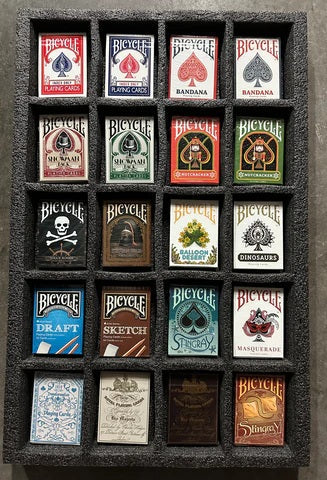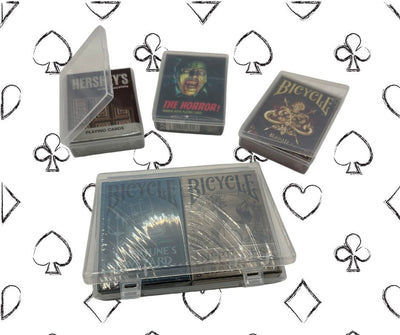(The first player to bid 5 tricks, becomes Napoleon for a round)
Card Game Rules
Napoleon, or Nap, is a trick taking game for two or more players. It is played with a standard 52 playing card deck with Aces high and 2s low. The objective of Napoleon is to either be the highest bidder and win all of your tricks or to win more tricks than the highest bidder.
For more trick taking games check out our guides for Forty-Five and Whist
If you are looking for cards to play Napoleon with, check out a standard deck here or check out one of our newest arrivals here.
Set Up
Before gameplay can begin, a dealer must be selected. To do so, players must choose a random card from a shuffled deck. The player with the lowest card becomes the dealer. Ties are broken with repeated drawings. The dealer shuffles the deck and then passes out, faced down, one set of three cards and one set of two cards to every player.
Bidding
After cards are received, a bidding process occurs starting with the player left of the dealer. The highest bidder leads the first card of the round. If the highest bidder bids 4 or less tricks, they are called Misère. A Misère bidder does not establish a trump suit. If the highest bidder bids all 5 tricks, they establish a trump suit with the first card they lead.
The first player to bid 5 tricks is called “Napoleon”. If another player wants to bids 5 tricks, they may do so. They are then called “Wellington” and they out bid a Napoleon. If yet another player wants to bid 5 tricks, they are called “Blucher” and they out bid a Wellington. Bidding ends if a player makes a Blucher bid.
Once bidding ends, the game becomes a competition between the highest bidder and the other players. The highest bidder wants to make their tricks while the other players want to stop them from doing so.
How to Play
The highest bidder leads the first card with play continuing clockwise. Players must follow suit or play trump (if trump was established) if they can. If they cannot, then the player must discard a card for only cards in the lead suit count. The player who plays the highest card wins the trick.
Scoring
If the highest bidder makes their number of bids, they receive that number of points. If a player makes and wins a Napoleon, Wellington, or Blucher bid however, they receive 10 points.
If the highest bidder fails to make their number of bids, the other players receive what the bidder’s points would have been. If the highest bidder fails to make a Napoleon bid, the other players receive 5 points; if they fail to make a Wellington bid, the other players receive 10 points; and if they fail to make a Blucher bid, the other players receive 20 points.
The first one to score 30 points wins.
For more information on Napoleon and its Rules, check out Wikipedia's article here and Pagat's article here.
Variations
Peep Nap
In Peep Nap, a single card is placed face down to the side after the deal is made. The highest bidder then has the option to look at the car. If they think the card will improve their hand, then they can trade the card with one from their hand.
Pool Nap
Pool Nap is a casino version of Napoleon. In Pool Nap, every player, who isn't the dealer, places an equal bet in the pot. The dealer matches the pot on their turn. The pot is then awarded to a player who makes a successful Napoleon bid. If a player tries to make a Napoleon bid and fails however, they must double the pot.
Sir Garnet
In Sir Garnet, an extra 5 card pile is dealt and placed faced down to the side of the gameplay area. If a player wants to bid Napoleon, they can pick up this pile and swap any of their cards with any of its cards as long as they still have 5 cards afterwards. If they bid Napoleon and fail however, they must pay double.
Looking for more card games to play? Check out this article:
40+ Great Card Games For All Occasions
About the author: John Taylor is a content writer and freelancer through the company Upwork.com. You may view his freelancing profile here. He has a B. A. in English, with a specialty in technical writing, from Texas A&M University and a M. A. in English from the University of Glasgow. You may view his previous articles about card games here and his LinkedIn profile here.






